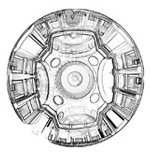
Is Religious Belief a Type of Knowledge?
ON THE PRESUMPTION OF NATURE’S INTELLIGIBILITY
Nor do I seek to understand that I may believe, but I believe that I may understand. For this, too, I believe, that, unless I first believe, I shall not understand. — St. Anselm
In our time, we have grown accustomed to thinking that religious claims, which we call “beliefs,” are the opposite of knowledge. In a game of free association, no one would likely respond to the word knowledge by saying “faith” or “belief.” They would more likely say “science,” “fact,” or “evidence.” We’re more likely to regard belief as an antonym for knowledge, and this is why many people regard religion and science as competitors and sometimes even enemies.
This attitude is a notable feature of what is often called modernism, a term that describes various cultural patterns that have developed over the past four centuries, that is, the modern or Enlightenment period. During this time (roughly 1600 to the present), people have become more literate, more secular, and more dependent on technology, urban ways of life, and science as a knowledge resource.
The growth of scientific understanding is the most impressive development that has occurred over these four centuries. Science has given the impression of making all things knowable, and with this comes the opposite notion that perhaps all things merely believed are expendable — religious beliefs in particular. If scientists can know things with certainty, why bother with things that are only speculative? The problem with this assumption is that it is a practical impossibility. There is no belief-independent knowledge, and in the following pages I will explain why this is so.
You May Also Enjoy
Reviews of Power Trips and Other Journeys... Feminism Without Illusions... The Poet's Work: An Introduction to Czeslaw Milosz... The Moral Vision of Dorothy Day: A Feminist Perspective... Naming The Silences: God, Medicine, and the Problem of Suffering... Tradition in a Rootless World: Women Turn to Orthodox Judaism... Liberalism, Conservatism, and Catholicism: An Evaluation of Contemporary American Political Ideologies in Light of Catholic Social Teaching... Anarchy and Christianity... Praying by Hand... Letters to Jess...Newman the Theologian: A Reader
In justifying cohabitation, these two Catholic "theologians" have abused their positions by undermining Church teaching.
Let’s imagine that basketball is a violent sport: the players punch and kick their way…

